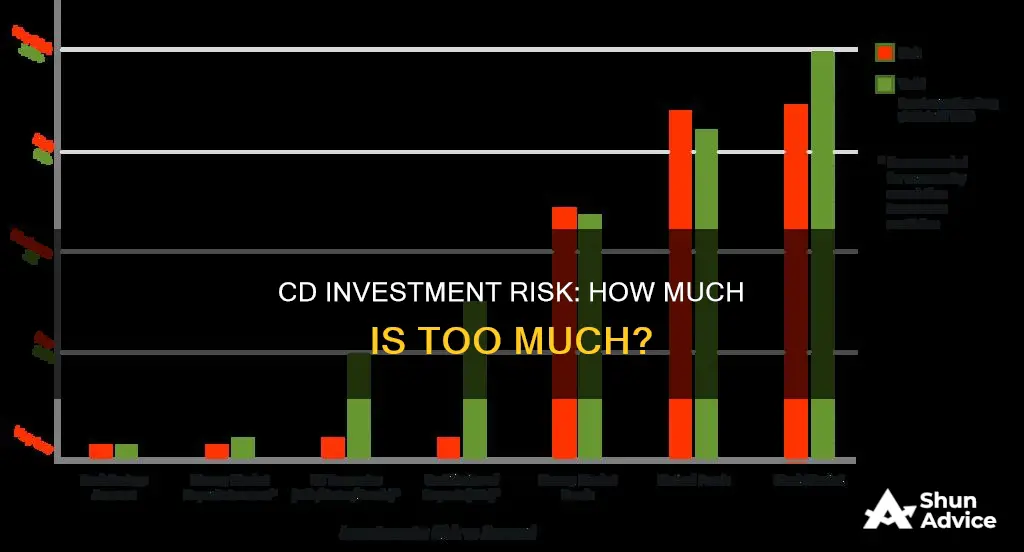
Certificates of Deposit (CDs) are considered a safe, low-risk investment option. They are commonly issued by banks, credit unions, and financial institutions, and are FDIC-insured, meaning your money is protected up to $250,000 per depositor, per bank. However, there are some risks associated with CDs, including inflation, market risk, issuer credit risk, and secondary market risk. It's important to understand these risks before investing in CDs to ensure they align with your financial goals and risk tolerance.
| Characteristics | Values |
|---|---|
| Risk | Low |
| Safety | FDIC-insured up to $250,000 per depositor, per bank |
| Returns | Predictable |
| Market risk | No market risk |
| Inflation | Risk of eroding total returns |
What You'll Learn

CDs are considered a low-risk investment option
CDs have fixed interest rates, so you'll know exactly how much you'll earn when the CD matures. This makes them appealing to many investors who like the idea of low-risk, predictable growth. CDs aren't tied to the stock market, so they don't fluctuate with its ups and downs.
However, it's important to note that there is still some risk involved with CDs. Inflation is a risk for CD investors receiving a fixed interest rate, particularly when locked in for 24 or 48 months. Inflation may erode your total returns if the inflation rate exceeds your interest rate. Additionally, several other forms of CDs have further risks, including market risk, issuer credit risk, and secondary market risk. For example, Yankee CDs may not be FDIC-insured.
Protecting Equity Investments: Strategies for Success
You may want to see also

CDs are FDIC-insured, protecting your money up to $250,000
Additionally, some forms of CDs carry other risks, such as market risk, issuer credit risk, and secondary market risk. For example, index-linked CDs may not be FDIC-insured, and the interest you earn is subject to market risk. Yankee CDs, which are issued by foreign banks domiciled in the United States, are another example of CDs that may not be FDIC-insured.
It's important to carefully consider the different types of CDs and their associated risks before investing. While CDs can be a great way to keep your money safe and growing, it's always a good idea to diversify your investment portfolio to minimise risk.
India's Space Exploration: Worth the Investment?
You may want to see also

Inflation is a risk for CD investors
While CDs are considered a safe investment, there are still some risks involved. Inflation is a risk for CD investors receiving a fixed interest rate, especially when locked in for 24 or 48 months. Inflation reduces your purchasing power, which means that the money you have won't go as far. If the inflation rate exceeds your interest rate, your total returns may be eroded.
CDs are FDIC-insured, so your money is protected up to $250,000 per depositor, per bank. This makes them a very low-risk savings option. However, it's important to note that this insurance only covers the principal investment and not the interest you earn. Other forms of CDs, such as Yankee CDs, may not be FDIC-insured at all.
CD risk and return are generally at the very low end of the spectrum. However, it's important to remember that there is no such thing as a risk-free investment. Even with CDs, there is always the potential for some form of risk, such as market risk, issuer credit risk, and secondary market risk.
When choosing a CD, it's important to consider your risk tolerance and financial goals. CDs can be a good option for investors who want low-risk, predictable growth. By understanding the advantages and limitations of CDs, you can decide if they align with your investment strategy.
Smart Investment Strategies: Making the Right Choices
You may want to see also

CDs have fixed interest rates
CDs are commonly issued by banks, credit unions, and financial institutions. They are considered safe investments, but there are conditions under which they may incur some form of risk. For example, several other forms of CDs have additional risks, including market risk, issuer credit risk, and secondary market risk. Index-linked CDs are subject to market risk, and Yankee CDs may not be FDIC-insured.
While CDs are generally considered low-risk, it's important to remember that there is still some risk involved. Knowing what to look for can help you avoid investment risk and problems. CDs can be a good option for investors who want to keep some money in a low-risk, predictable growth investment.
Investing in India: Your Guide to Getting Rich
You may want to see also

CDs are not tied to the stock market
CDs are considered a safe investment option, with low risk and predictable returns. They are FDIC-insured, meaning your money is protected up to $250,000 per depositor, per bank. This makes CDs a very low-risk savings option.
However, it's important to remember that there is no such thing as a completely risk-free investment. While CD risk and return are generally at the very low end of the spectrum, there are still some conditions under which they may incur risk. For example, inflation is a risk for CD investors receiving a fixed interest rate, particularly if they are locked in for 24 or 48 months. If the inflation rate exceeds your interest rate, it may erode your total returns.
Additionally, some forms of CDs have other risks, including market risk, issuer credit risk, and secondary market risk. For example, with index-linked CDs, your principal investment may be FDIC-insured, but the interest you earn is not and is subject to market risk. Yankee CDs, which are issued by foreign banks domiciled in the United States, are not directly insured by the FDIC.
Equity Method Investments: Coca-Cola's Strategic Growth Partners
You may want to see also
Frequently asked questions
CDs are generally considered a low-risk investment option. However, there are some risks associated with CDs, including inflation, market risk, issuer credit risk, and secondary market risk.
Inflation is a risk for CD investors receiving a fixed interest rate, particularly when locked in for 24 or 48 months. If the inflation rate exceeds your interest rate, it may erode your total returns.
Yes, several other forms of CDs have additional risks, including index-linked or market-linked CDs, which are subject to market risk and other risks. Yankee CDs, issued by foreign banks domiciled in the United States, may not be FDIC-insured.
While CDs are considered safe investments, it's important to understand the potential risks and know what to look for to avoid investment problems. Diversifying your portfolio and considering your risk tolerance can help you make informed decisions about CD investments.
Yes, CDs offer predictable returns with fixed interest rates, allowing you to know exactly how much you'll earn. They are also FDIC-insured, protecting your money up to $250,000 per depositor, per bank.







